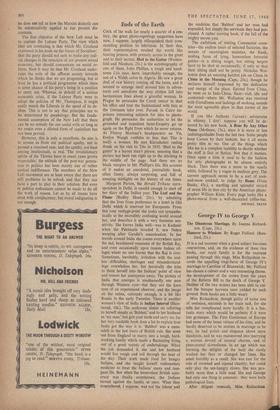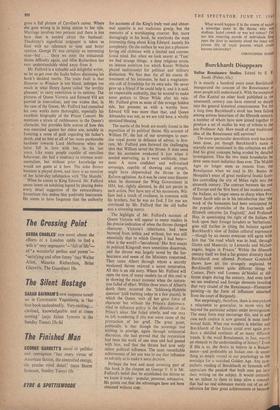George IV to George V
The Disastrous Marriage. By Joanna Richard- son. (Cape, 25s.) Hanover to Windsor. By Roger Fulford. (Bats- ford, 25s.) IT is a sad moment when a good subject becomes overwritten, and, on the evidence of these two books, our royal family is for the moment passing through this stage. Miss Richardson re- cords the appalling tragi-farce of George IV's marriage to Caroline of Brunswick; Mr. Fulford has chosen a calmer and a very interesting theme, the development of the crown from the years of the Reform Bill to the death of George V. Neither of the two writers has been able to col- lect the bumper harvests once yielded by such ground. Both books are a little weary.
Miss Richardson, though guilty of some sins of omission, succeeds in her main task, for she tells her complicated story lucidly. It is a fan- tastic story which would be pathetic if it were less grotesque. The First Gentleman of Europe had some of the lesser virtues of his time, and he hardly deserved to be smitten in marriage as he was; he had polish and elegance above mere dandyism, and he was manoeuvred into marrying a woman devoid of natural charms, and of phenomenal slovenliness. In an age which was learning the delights of the bath she rarely washed her face or changed her linen. She smelt horribly as a result. She was cast for the role of crowned and injured chastity, but could only play the sex-hungry clown. She was pro- bably more than a little mad. She and George had only one thing in common : they were both pathological liars.
After diligent research, Miss Richardson gives a full picture of Caroline's career. Where she goes wrong is in being untrue to her title. Marriage involves two persons and there is less here than is needed about the husband: Thackeray's superficial judgment is taken as final with no reference to later and better opinion. George IV was certainly an interesting man—but . . . there we meet the exhausted- theme difficulty again, and Miss Richardson has very understandably shied away from it.
Mr. Fulford is a valuable and delightful writer, so let us get over the faults before discussing his book's decided merits. The main fault is that Hanover to Windsor is too bland, indulges too much in what Henry James called 'the terribly pleasant,' to carry conviction in its entirety. The pictures of Queen Victoria and Edward VII are painted in rose-colour, and one wishes that, in the case of the Queen, Mr. Fulford had consulted his own works more thoroughly, especially his excellent biography of the Prince Consort. He mentions a strain of ruthlessness in the Queen's character, but provides little notion of how this was exercised against her eldest son, notably in fostering a sense of guilt regarding his father's death, and no hint at all of her more pardonable hardness towards Lord Melbourne when the latter fell in love with her, in his last years. Like many people capable of merciless behaviour, she had a tendency to extreme senti- mentalism, but without prior knowledge we would not guess at it here. The John Brown business is played down, and there is no mention of her latter-day infatuation with 'The Munshi.'
When he comes to King Edward, Mr. Fulford seems intent on subduing legend by playing down every detail suggestive of the extraordinary, Sometimes this makes him positively inaccurate. He seems to have forgotten that the authority
for accounts of the King's truly vast and abnor- mal appetite is not malicious gossip, but the memoirs of a worshipping courtier. But, more damagingly to his book, he overlooks the most interesting thing about King Edward, namely his complexity. On the surface he was just a pleasure- loving old clubman with a limited and conven- tional mind. But when we look nearer at 'Turn' we find strange things: a deep religious strain, an intense ambition (on, which Kaiser Wilhelm played maliciously) for political and military distinction. We find that. for all his coarse ill- treatment of his intimates, he had a magnanim- ous cult of friendship for its own sake. He never gave up a friend if he could help it, and it is said, on respectable authority, that he wanted to make some gesture to Oscar Wilde after his ruin. Mr. Fulford gives us none of this strange hidden side, but presents us with a worthy bore. Edward VII was more than that, and Queen Alexandra was not, as we are told here, a wholly unmixed blessing.
The merits of the book are mostly found in the exposition of its political theme. His account of William IV, the last of our sovereigns to exer- cise royal power in defiance of advice, is first- rate. Mr. Fulford puts forward the challenging idea that William saved the throne. It does seem that his accession weakened it just when it needed enervating, as it were antibiotic, treat- ment. A more confident and well-trained sovereign, capable of showing real strength, might have shipwrecked the throne in the Reform agitation. As it was he came near disaster when he dismissed the Whig Government in 1834, but, rightly alarmed, he did not persist in such action. Nor have any of his successors. Wil- liam had a touch of craziness, in common with his brothers, but he was no fool. I for one am convinced by Mr. Fulford that the old buffer was a crowning mercy.
The highlight of Mr. Fulford's account of Queen Victoria will appear to many readers in his precise indication of when the throne changed character. Victoria's inheritance had been battered from within and without, but was still
essentially that to which George. I had been—
what is the word?—'introduced? Her first essays in political Kingcraft were sometimes disastrous, and the throne was largely saved by the for- bearance and sense of the Ministers concerned. Then came Albert through whom a secretly weakened throne enjoyed a secret restoration.
All this is an old story. Where Mr. Fulford will open the eyes of many readers (as of this one) is
in showing the exact moment when the restora- tion failed of effect. Within three years of Albert's death there occurred the 'Schleswig-Holstein question' (still burning today in a few places), in which the Queen, with all her great force of character but without the. Prince's diplomacy, tried to influence policy in the direction of the Prince's ideas. She failed utterly, and one may be left wondering if this was some cause of the protraction of her grief. The great point, politically, is that though the sovereign lost nothing in prestige, again through ministerial discretion, she had proved that the restoration had been the work of one man and had passed with him, and that the throne had now only minor political influence. The most remarkable achievement of her son was to use that influence so adroitly as to make it seem decisive.
Perhaps the best and most arresting part of this book is the chapter on George V. It is Mr. Fulford's belief that he established the throne as we know it today : popular, personal, adrnassive. He points out that the advantages have not been obtained without cost:
What would happen if in the course of nature a sovereign came to the throne who wet studious, hated crowds or was not robust? Did not this recurring parade of individuals fling open the door to curiosity about the inner and private life of royal persons which could become intolerable?
CHRISTOPHER SYKE











































 Previous page
Previous page